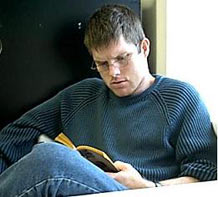 Monday, May 08, 2006
Monday, May 08, 2006
An Unintended Series - Report #1 from Integrales 2006
Two or three years ago, I composed a work for solo alto saxophone titled, Figment. Later the same year, I composed a work for solo violin which I named Figment No. 2. I bet this wasn't the first time the lack of imagination for a title has been the impetus for a composer beginning a series of works.
Last summer, I was asked by Al Theisen to compose a short work for solo flute for his then fiancee, Misty Rondeau (now Theisen), to mark the occasion of her 24th birthday.
First, I was excited about this idea because Misty is a wonderful flutist. I have heard perform many times and enjoyed it immensely.
Secondly, her name was much cooler before she married that Theisen guy.
So before I knew it I was composing the third work in an unintended series of short solo instrumental works. I began listening to the only recordings I owned of solo flute works: two recordings of Carter's Scrivo in vento (one dreadful & one wonderful recording) and a CD of Takemitsu flute works.
Al's request for a work was only a third of Misty's gift. He composed a work as did our friend, Marc Ballard (whose irate comments are seen occasionally around S21). These works were not composed as a triptych but seemed to form a nice suite together. Misty performed each of these works beautifully this weekend at the Integrales 2006 New Music Festival.
So that's the story of my Figment No. 3 "Euterpe" which was performed this weekend at the festival. I'll have a couple more posts in a day or two about the festival.
posted by Everette Minchew
7:09 PM
|
|
 Composer Everette Minchew (born 1977) is consistently active in the creation, performance, and promotion of contemporary music. Moderately prolific, his catalogue includes small chamber pieces for violin, piano, various wind instruments, harpsichord and electronic music. Current commissions include a string trio and an opera based on an 11th-century crusades tale.
His earliest musical training came at the age of eleven when he began playing alto saxophone; it wasn’t long until he began his first attempts in composition.
Composer Everette Minchew (born 1977) is consistently active in the creation, performance, and promotion of contemporary music. Moderately prolific, his catalogue includes small chamber pieces for violin, piano, various wind instruments, harpsichord and electronic music. Current commissions include a string trio and an opera based on an 11th-century crusades tale.
His earliest musical training came at the age of eleven when he began playing alto saxophone; it wasn’t long until he began his first attempts in composition.
He received a Bachelor’s Degree in Music History from the University of Southern Mississippi, where he studied saxophone under world-renowned soloist, Lawrence Gwozdz.
Fearing that traditional university training would hinder his development as a progressive composer, he abandoned the idea of formal lessons in favor of an intense private study of modern masterworks.
Minchew's works are characterized by their intense timbral explorations and brutal dissonance. That is not to say, however, that the compositions are devoid of beauty. In the first of the Two Brief Pieces, for example, the harpsichord chimes stringent yet haunting chords evoking a sense of loss.
Other pieces, like the Figment No. 2 "Juggler's Fancy" play upon the kaleidoscopic interaction between timbres and tones. The rapid alternation of pizzicato, arco bowing, and extreme glissandi remind the listener of Xenakis coupled with a Berio Sequenza. Minchew's Invention "Two-Part Contraption" for piano owes much to Ligeti's etudes and boogie-woogie jazz.
His music has been performed around the United States, and he was the featured composer at the 2005 Intégrales New Music Festival in Hattiesburg, Mississippi.
He currently resides in Hattiesburg, Mississippi with his wife, Cheryl.
CONTACT INFORMATION
| |



